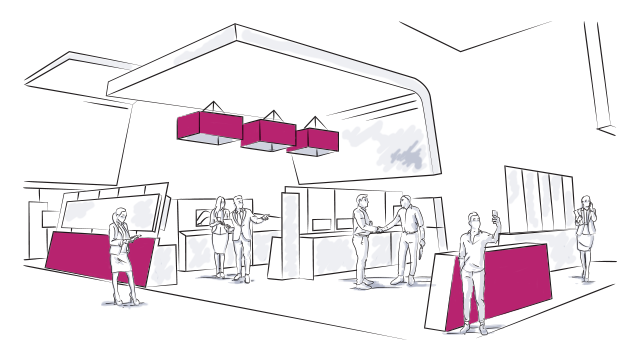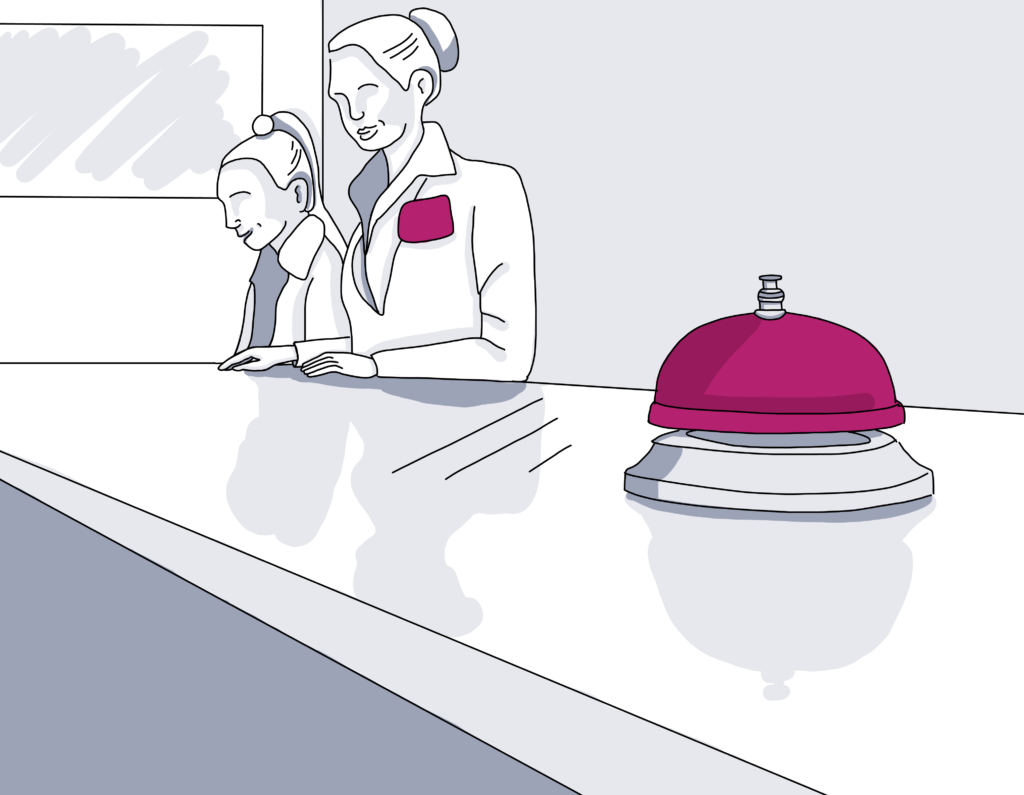
Wednesday Wisdom: 7 Powerful Strategies to Turn Around a Failing Hotel
If a hotel is struggling, the challenge of boosting performance and staying afloat can seem insurmountable. But with a few creative strategies, your property can begin to capitalize on its strengths and turn things around.
Read on to learn critical strategies – from ramping up group sales and elevating customer experience, to rein in spending and uncover trouble spots – to turn a failing hotel into a thriving one.
7 ways to turn around a failing hotel
1. Uncover trouble spots and strengths
Think of this as a fast-paced SWOT analysis. Developed between 1960 and 1970 at the Stanford Research Institute, a SWOT analysis identifies the Strengths, Weakness, Opportunities, and Threats to a particular company, department, product, or service. A full SWOT analysis is essential when adding assets to your portfolio and is a helpful way to prevent a hotel from becoming distressed in the first place.
Focus on the strengths and weaknesses of the property so you can prioritize critical changes, without inadvertently undermining existing strengths.

Problem areas common for distressed hotels include:
- Lack of differentiators. Hotels are sure to fall behind without a competitive advantage over other hotels in the same market and region.
- Outdated or glitchy guest-facing tech. Slow Wi-Fi or an inefficient A/V setup can cause problems for business travelers, groups, and meeting planners. Ensure a seamless experience with fast Wi-Fi, app-based mobile check-in, text-based concierge services, and custom digital content. Small investments in the latest technology can go a long way to updating a distressed hotel.
- Poor implementation of CRM software. Ineffectual CRM use is a missed opportunity. When used well, customer relationship management software can drive group sales and improve interactions with guests and event planners.
- Weak performance in direct bookings. Direct bookings are more profitable for hotels than those made through online travel agencies (OTAs), which include commissions.
- Location. Hotels face definite hurdles to viability when located in a region experiencing an economic downturn or near a tourist area losing popularity.
- Negative guest feedback and reviews without prompt responses. When a hotel is missing the customer service mark, there are almost always warning signs within guest reviews, even when the number of stars or percentages remain high. Reviews can reveal specific, sometimes easy-to-resolve issues, such as slow front desk responsiveness after a particular hour or a severely underwhelming continental breakfast. Additionally, replying consistently to reviews results in a ratings increase, according to a 2018 study of tens of thousands of reviews on TripAdvisor.
Don’t get stuck focusing on the missing pieces alone. Even the most distressed hotels likely have strengths that only require a quick polish, as well as hidden information that can guide the turnaround strategy.
Strengths and opportunities to watch for:
- Customer profiles. The hotel’s CRM is a treasure trove of helpful data when you know what to look for. Explore the hotel’s history of group bookings and customer segments. Business conferences? Weddings? Family vacationers? It’s possible the hotel’s typical guest is not ideal for the local market, or the hotel draws business travelers but could optimize business conference bookings.
- Explore data portfolio-wide. Let flourishing hotels within your portfolio guide your turnaround strategy. Analyze the cost of acquisition for key customer segments, along with the data on returning business and room rates paid within those segments. This process will determine the ideal customer profile, and you can ramp up marketing outreach to these groups.
- Location. Hotels near interesting, unique landmarks, or within booming economic development zones, have a leg up on the competition. Leverage those more effectively with marketing that highlights local attractions or reaches out to planners at regional businesses.
2. Keep the change process transparent, clear, and positive
Discuss the key findings of the SWOT analysis with the specific hotel’s team, and share what those findings mean in the short- and long-term. You don’t have to go over each detail with on-site employees, but the overarching strategy should be transparent. It’s also essential to acknowledge achievements, show appreciation, and provide constructive feedback for the efforts of the current staff from day one.
Research into employee engagement consistently finds workers are happier and more productive when they understand what the organization is doing, expectations are clear, and hard work is recognized. The research also finds businesses with engaged employees outperform companies with disengaged workers.
3. Upgrade tech to streamline and automate essential processes
Streamlined technology is critical to ramping up group sales and elevating the overall customer experience, both of which are essential to the turnaround process.
The property’s sales team can use the CRM to pinpoint missed opportunities in event room reservations, such as annual quiet periods during which they can offer discounted rates to planners for meetings for local businesses, colleges, and nonprofits. Win/Loss reports can highlight common reasons for lost leads, whether it’s slow response times or outdated A/V equipment in the conference rooms.
Technology can also help automate processes that drive business and enhance customer service. With apps like Zapier, for example, sales teams can automate emails to planners from companies and universities, and set reminders to check in on high-value group clients to ensure they have everything they need from the start of a conference to the end.

4. Rein in excess spending
You need to divert all discretionary spending to the areas of the hotel’s operation that will have the most positive impact on the customer experience and revenue growth”from renovations to tech upgrades to service training. There are many opportunities to reduce spending inefficiency, but easy wins include:
- Schedule staff to match occupancy and event rates.
- Upgrade lighting and HVAC systems with sensors that turn lights off and set air conditioning and heating to energy-saving temperatures when rooms are empty.
- Cross-train employees so you can call on existing employees when short-staffed, rather than adding to the payroll.
5. Focus on outstanding service”and give employees the tools to deliver it
Front-line employees have a significant impact on how guests feel about the hotel. Look for training shortfalls in all areas”from housecleaning to front-desk technology to people skills.
During this process, it will become apparent that some staff members are resisting change and negatively impacting the workplace culture. Unfortunately, employees who are ignoring directives or are otherwise displaying resistance to the repositioning process must be replaced for the changes to succeed.
The remaining employees are likely engaged in the turnaround process, so make sure you support their efforts. If you ask employees to go above and beyond to resolve customer issues, make sure you have enough staff on-hand so some employees can tend to problems, while others keep operations running smoothly.
Despite the rise of mobile check-in and text concierge services, guests still want satisfying face-to-face interactions. Offer soft-skills training to front- and back-of-house staff so communication with guests is friendly and authentic. Training to help staff manage customer complaints calmly and graciously is also invaluable.

6. Use psychology as an advantage
Identify a strategic team to address all of the research you just conducted and ensure they’re psychologically prepared for the worst. That way, they are less likely to wonder out loud how things ever got so bad and offend the existing hotel team in the process”a sure way to establish deep resistance to the impending changes.
What does this mean in action? Hold a strategic meeting before diving into a struggling hotel’s specific issues and before the first site visit to make sure the entire turnaround team is on the same page about the end goal of the project. The focus should be on repositioning the hotel, rather than assigning blame. Of course, it’s necessary to understand the particulars of what went wrong, but these problems rarely start with a single issue or individual.
Remember, too, that you are walking into a property where management and employees are very likely worried and possibly defensive. Change is most certainly in the works, but you should treat everyone respectfully throughout the process. Introduce yourself to the on-site staff, from housecleaning to management, and learn their names as quickly as you can. Chances are the majority of the staff have been doing the best they can”kindness matters.
And, occasionally, the team will get lucky and find the situation is far less dire than expected. A win from the starting line!
7. Prevent future problems with accurate forecasting
Accurately forecasting group demand, changing customer segmentation, and industry trends that relate specifically to your key markets can help hotels prepare for problems on the horizon and busy seasons.
Make sure you are tracking the forecasts that most matter to your portfolio and your failing hotel. Perhaps you’ve been focused on leisure group forecasts when the hotel’s appeal has shifted to business groups and industry conferences. Knowing this can help you aim marketing dollars toward a more valuable audience of corporate event planners.
Forecasts can also highlight shifts in room-type popularity, best-selling event spaces, and the geographic origin of incoming business.
Valuable forecasts are impossible without consistent, day-to-day data inputs. Make sure the sales team understands the value of forecasting and how their detailed information helps make accurate predictions possible. A CRM is critical in providing these insights by tracking leads, actualized bookings, and issues.
Turning around an underperforming hotel is challenging, but also entirely possible. With analysis, action, and a mix of smart spending and savings, you can flip the trajectory of a hotel from failing to prospering.
Ready to gain valuable insights from a CRM? Request a demo of Social Tables’ Group Sales & Catering CRM for hotels”it’s free and easy to use!
Or learn more about how a CRM can boost group business.

